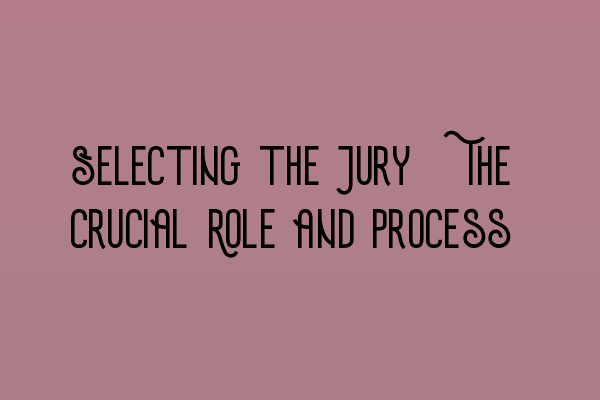Selecting the Jury: The Crucial Role and Process
When it comes to criminal trials, one of the most crucial parts of the process is selecting a fair and impartial jury. The jury plays a vital role in ensuring justice is served, and therefore, the process of jury selection must be thorough and unbiased.
The Importance of Selecting the Right Jury
The jury is responsible for determining the guilt or innocence of the accused based on the evidence presented in court. Their decision can have life-changing consequences for the defendant, making it essential to have a fair and impartial jury.
Juries are made up of ordinary individuals from the community who are selected randomly. This ensures that a diverse range of perspectives is represented in the jury room and that justice is carried out fairly.
However, the selection process should not be taken lightly. Both the prosecution and the defense have the opportunity to question potential jurors to assess their suitability for the case. This process is known as voir dire, and it allows attorneys to uncover any potential biases or prejudices that may affect a juror’s ability to be impartial.
During voir dire, attorneys may ask a range of questions to potential jurors, such as their occupation, personal experiences, or beliefs. This helps them assess whether a prospective juror’s background may impact their ability to make an impartial decision.
The goal of jury selection is to identify jurors who can objectively evaluate the evidence presented in court and render a fair verdict. Attorneys need to consider factors such as juror attitudes, prejudices, and any potential conflicts of interest. This process is crucial in ensuring that the jury is free from any undue influences and can make an unbiased decision based solely on the evidence presented.
The Optimal Jury Selection Process
The process of selecting a jury involves multiple steps and requires careful consideration from both the prosecution and the defense. Here is a brief overview of the optimal jury selection process:
- Compile a list of potential jurors: Before the trial begins, a list of potential jurors is compiled from voter registration lists or other relevant sources. This list is generated randomly, ensuring a diverse pool of individuals.
- Voir dire: The attorneys for both sides question potential jurors to assess their impartiality and suitability for the case. It is essential to ask open-ended questions and engage in active listening to uncover any potential biases.
- Challenges: After the initial questioning, both the prosecution and the defense have the opportunity to challenge potential jurors. There are two types of challenges: for cause and peremptory challenges. Challenges for cause can be made if a juror demonstrates a clear bias or inability to be impartial. Peremptory challenges, on the other hand, allow attorneys to dismiss potential jurors without stating a specific reason.
- Jury selection: Once the challenges are made, the final jury is selected, consisting of individuals who are deemed suitable and impartial for the case.
It is crucial for attorneys to be strategic in their jury selection process. They must carefully analyze potential jurors’ responses during voir dire and consider their compatibility with the case at hand. Thorough preparation and knowledge of the relevant laws and regulations are essential for selecting the most favorable jury.
Conclusion
Choosing a fair and impartial jury is a critical aspect of any criminal trial. The selection process, which involves thorough questioning and scrutiny of potential jurors, ensures that justice is upheld and defendants receive a fair trial.
To succeed in the legal profession, it is vital to be well-informed and prepared for every aspect of criminal law and practice. To enhance your knowledge and skills, consider taking SQE preparation courses, such as those offered at SQE 1 Preparation Courses and SQE 2 Preparation Courses. These courses provide comprehensive training for the SQE exams, enabling you to excel in your legal career.
For more information about the SQE exams and important dates, please visit SRA SQE Exam Dates. Additionally, you can test your knowledge and further practice for the SQE exams using the SQE 1 Practice Exam Questions and SQE 1 Practice Mocks FLK1 FLK2.
